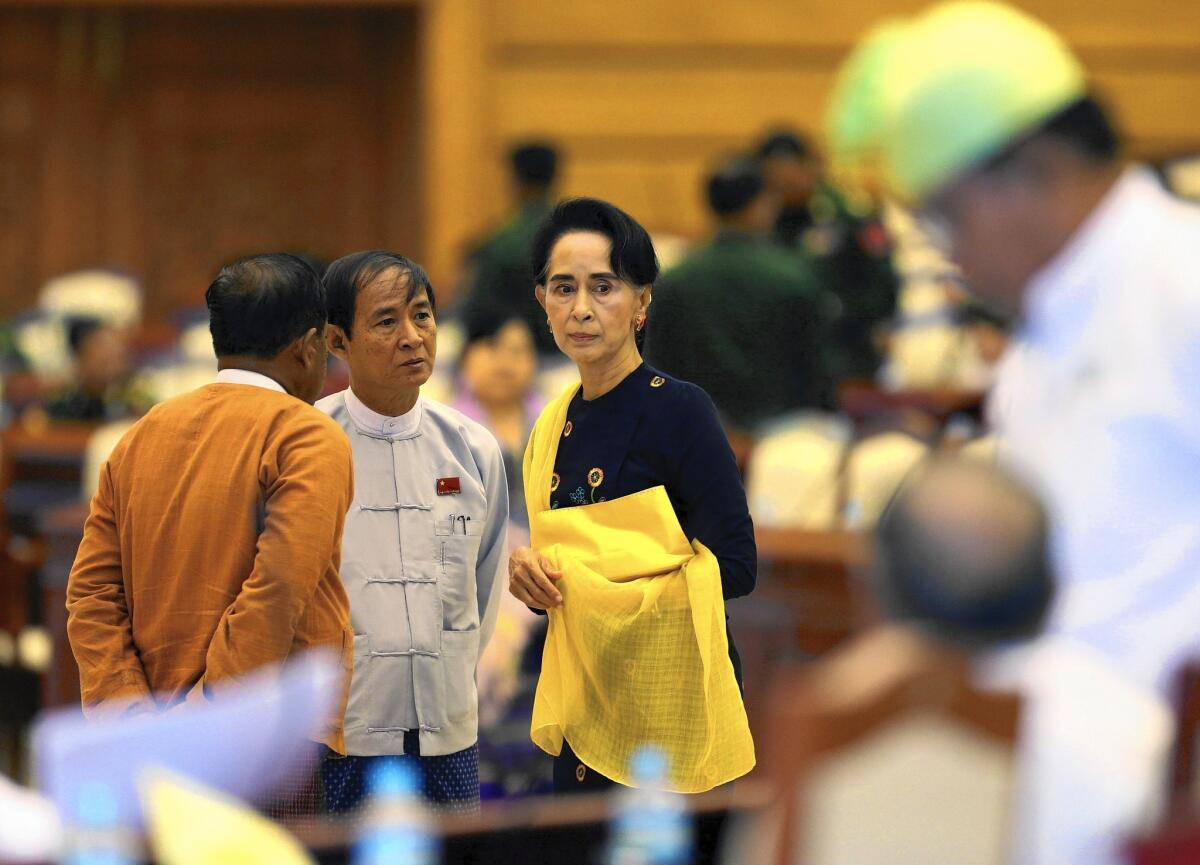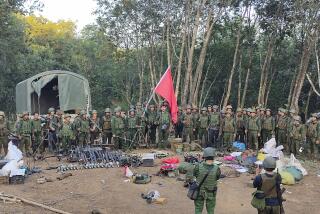In Myanmar, Aung San Suu Kyi faces postelection test

Myanmar’s military has tried just about everything to keep Aung San Suu Kyi from power.
It placed her under house arrest for 15 years, tossed out the results of elections her party won in 1990 and wrote a constitution preventing her from becoming president. When it seemed that her opposition movement might fare well in just-concluded parliamentary elections, the army-backed ruling party began doling out gifts to voters.
Two months before the vote, Suu Kyi made a prediction to advisors: Her party would win, and win big. So she might have been the least surprised of anyone by her party’s Nov. 8 landslide, which gave Myanmar’s pro-democracy forces control over the parliament and probably the next president.
NEWSLETTER: Get the day’s top headlines from Times Editor Davan Maharaj >>
Suu Kyi, whose late husband was British, as are her sons, is barred from becoming president: The constitution excludes anyone with a foreign spouse or children from the office. But aides say the Nobel Peace Prize laureate and democracy activist has been forming a strategy to wield power from within a political system that remains stacked in favor of the army and had been designed to minimize her influence.
“She was really confident two months ago, even as other people were doubtful,” said Sean Turnell, an Australian economist and advisor to Suu Kyi. “She was proven right. So I can’t imagine she’s anything other than prepared for what’s ahead.”
Unquestionably her country’s most popular politician — and an international symbol of Myanmar’s struggle against five decades of military rule — Suu Kyi will be forced to govern from the shadows when the new parliament is seated early next year. How she exercises power could determine the future of a tentative democratic transition that Myanmar’s military has tightly controlled.
One of the legislature’s first tasks will be to select a president, who in turn names a Cabinet. Suu Kyi’s National League for Democracy, or NLD, will have a nearly 60% majority in the parliament, but 25% of seats are reserved for the military and an additional 6% were won by a military-aligned party, giving Myanmar’s generals a strong say in the presidential pick.
Bristling over the restrictions, Suu Kyi has indicated she will look for ways around them, perhaps by installing a president who answers to her, or trying to rewrite the constitution.
She suggested in one interview that the president would have “no authority” and take orders from the NLD, which is less a political organization than a party created around her, down to the ubiquitous campaign T-shirts and banners that bear her likeness.
“In any democratic country it’s the leader of the winning party who becomes the leader of the government,” Suu Kyi said last week in an interview with Channel NewsAsia. “And if this constitution doesn’t allow it, then we’ll have to make arrangements so we can proceed along usual democratic lines.”
Such remarks have made many of Suu Kyi’s supporters cringe, including some in the Obama administration, which has lifted most sanctions against Myanmar since 2012 to encourage the reforms that led to the elections. But to Suu Kyi’s allies, the comments are a sign of resolve, and are justified, given how Myanmar’s new Constitution was written.
After refusing to let the NLD form a government after it won the 1990 elections, the ruling generals in Myanmar, also known as Burma, handpicked a committee to draft a new charter, which was completed in 2007 after many delays. The following year, a week before a nationwide referendum on the charter, Cyclone Nargis battered Myanmar, leaving 130,000 people dead or missing.
The military held the referendum anyway and said that 92% of eligible voters approved the charter, a figure that seemed highly unlikely given the fact that vast swaths of the country suffered heavy damage.
The constitution reflects the military’s view that it is the only institution capable of ensuring Myanmar’s stability. It gives the army control over the defense, border security and home affairs ministries. A three-quarters majority in the parliament is required to amend the constitution, meaning that the military, with its reserved seats, in effect wields a veto over any changes.
“The point she was making is the constitution is not a sacred document or a careful document like the U.S. constitution,” advisor Turnell said. “It was written explicitly to keep someone out of office. She was saying we shouldn’t get caught up on the finer points of a document that’s itself not really legitimate.”
“Changing the constitution is still very much a priority goal” for Suu Kyi, Turnell said. But in June, the parliament rejected efforts to lift the military’s veto and change the rule barring her from becoming president, a sign of the army flexing its muscle.
“If Suu Kyi wants to amend the constitution, she’ll need one of [the military’s] votes,” said Erin Murphy, a former U.S. official who leads Inle Advisory Group, which advises investors on Myanmar. “That could be possible in the future but not now.”
Suu Kyi could become speaker of parliament, which would give her a spot on the powerful national security council. But analysts say she’s unlikely to do so because it’s a highly technical post that requires long stretches in Naypyidaw, the remote seat of government.
There is precedent in the region for a strong party leader who calls the shots for a figurehead president or prime minister.
Indian National Congress Party leader Sonia Gandhi was widely seen as giving orders to diffident Prime Minister Manmohan Singh. Indonesian President Joko Widodo owes his election to party boss Megawati Sukarnoputri. Thailand’s ousted president, Yingluck Shinawatra, was believed to be a stand-in for her brother, Thaksin, who fled the country to escape corruption charges.
None is a recipe for stable government, analysts said. Although Suu Kyi commands intense loyalty within the party, the constitution equips the president with vast powers, making the office difficult to control.
A parliament member for three years, Suu Kyi has at times shown deference to the military, helped by the fact that her late father, Aung San, founded Myanmar’s modern army. Since the elections she has talked of building a government of “national reconciliation.”
Voter mandate and soaring expectations probably give Suu Kyi authority to pursue some of the NLD’s domestic policy goals, including agricultural reforms, improving infrastructure and boosting foreign investment.
“The party would have looked to her for guidance regardless, and she clearly has and will set the agenda,” said Murphy, the former U.S. official. “How that will work in practice is another question.”
Analysts predict the generals will resist any effort to curb military spending — estimated at about 40% of Myanmar’s total budget — or loosen the army establishment’s grip on lucrative industries. The army also expects to retain control of the effort to make peace with ethnic rebel groups fighting a long-running insurgency in northern Myanmar.
Under the army-backed civilian government that has held power since 2010, senior military figures, including retired Gen. Than Shwe, have been widely believed to hold the reins of the democratic transition. Any attempt to tread on its turf could prompt a backlash by an army establishment that retains the ability, under the constitution, to reimpose direct military rule.
“The cardinal rule in this country is you cannot go against the military, and we don’t know how well she can work with them,” said a senior member of a government agency who requested anonymity to avoid antagonizing Suu Kyi or the armed forces.
“There are certain things that are off-limits to the NLD and they have to be very careful about touching those. If they don’t understand how to do that, all hell will break loose.”
Twitter: @SBengali
ALSO
World Toilet Day: China aims to bring the WC closer to the Web
Suspected mastermind of Paris attack died in police raid, officials confirm
Allowing Bashar Assad to continue leading Syria is ‘unimaginable,’ Obama says
More to Read
Start your day right
Sign up for Essential California for news, features and recommendations from the L.A. Times and beyond in your inbox six days a week.
You may occasionally receive promotional content from the Los Angeles Times.







